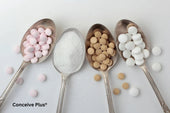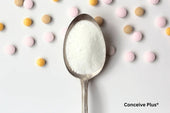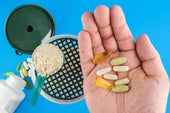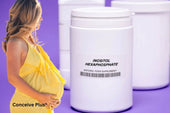The Truth About Insulin Supplements: Are They Worth It?

Insulin is a hormone that helps move sugar from your blood into your cells for energy. Insulin resistance occurs when your body’s cells do not respond well to this hormone.
When cells resist insulin, sugar stays in the blood, eventually leading to prediabetes and type 2 diabetes. Over time, this increased blood sugar can damage body organs, like the pancreas and kidneys. Insulin resistance is also negatively associated with female fertility health [1].
Besides medical treatment options, an area that sparks curiosity is insulin supplements. But the question is, are they effective? And if so, which is the best over the counter supplement for insulin resistance?
Insulin Resistance and Female Fertility
Insulin is not only associated with blood sugar levels, but it also affects your hormone balance. When insulin levels are high, they can influence other hormones in your body.
Polycystic ovary syndrome (PCOS) is a common hormonal condition in women and is one of the major reasons behind female infertility cases. Many women with PCOS experience insulin resistance [2].
Image Source: https://www.imaware.health/blog/insulin-resistance-and-pcos
High levels of insulin can cause the ovaries to produce too much testosterone — a hormone that, when present in excess, can disrupt ovulation. This means that women with PCOS might have irregular menstrual cycles and find it more difficult to get pregnant.
By managing insulin resistance, women with PCOS may see improvements in their hormonal balance and overall symptoms. Such an improvement can help restore regular ovulation and improve fertility.
For a broader approach to nutritional support, consider exploring our article 'Multivitamins for Diabetics: Do They Really Help?' to see if these formulations can further enhance your diabetes management.
Supplements That May Improve Insulin Resistance
Although the scientific evidence is limited about the effectiveness of dietary supplements for reducing insulin resistance, there are some nutrients that may have the potential. These include:
-
Vitamin C
People with insulin resistance are at a higher risk of inflammation and cell damage. Vitamin C is a powerful antioxidant that helps protect cells from damage. It also supports the pancreas in insulin production and may help improve insulin sensitivity [3]. So, when included as part of a balanced diet, vitamin C may support better blood sugar control and overall improved health.
-
Chromium
Chromium is a trace mineral that plays a role in carbohydrate and lipid metabolism. Research indicates that chromium may help enhance the body’s response to insulin, making it easier for cells to absorb sugar from the blood [4].
-
Magnesium
Magnesium is needed for hundreds of body processes, including proper insulin function. Studies show that low magnesium levels are linked to increased insulin resistance [5]. Thus, ensuring you get enough magnesium through diet or supplements might help improve insulin sensitivity.
-
Zinc and Vitamin D
Both zinc and vitamin D play a role in glucose metabolism and insulin resistance. Zinc helps improve glucose metabolism and lower blood sugar levels. On the other hand, vitamin D supports better insulin sensitivity, making it easier for the body to regulate blood sugar.
-
Inositol
Inositol, a naturally occurring sugar, has shown promising results in women with PCOS. Studies suggest that it can help the body use insulin more efficiently, and support overall metabolic health [6]. It works by improving insulin signaling inside cells, making them more responsive to insulin.
-
Probiotics
Good bacteria in your gut, or probiotics, can influence your metabolism and overall health. A healthy gut microbiome is linked to better insulin sensitivity, so adding a probiotic supplement might be beneficial.
Choosing the Best Insulin Supplement
If you're thinking about trying an insulin supplement and are confused about which is best over the counter supplement for insulin resistance, there are a few key things to look for.
Check the ingredient list for nutrients like vitamin D, vitamin C, magnesium, chromium and inositol. Read customer reviews to see if others have had good results. Most importantly, go for supplements that are third-party tested for quality and safety.
Additional Ways to Improve Insulin Resistance
While insulin supplements need more testing to evaluate their effectiveness, there are many other scientifically proven ways to improve insulin resistance. These include:
-
Dietary Strategies
A diet that focuses on whole, unprocessed foods can significantly help manage insulin resistance. People with insulin resistance should focus on fiber-rich foods such as vegetables, fruits, whole grains, and legumes.
Fiber slows down the absorption of sugar into the blood, which helps prevent spikes in blood sugar levels. At the same time, reducing refined carbohydrates can help lower insulin resistance.
-
Physical Activity
Regular exercise is one of the best ways to improve insulin sensitivity. When you exercise, your muscles use glucose for energy, which helps lower blood sugar levels even if your insulin is not working perfectly.
Experts recommend getting at least 150 minutes of moderate aerobic exercise each week, along with a couple of strength training sessions to build muscle mass.
-
Other Lifestyle Modifications
Other lifestyle changes play an important role as well. Getting enough quality sleep helps regulate hormones, including insulin. Managing stress through activities like meditation or yoga can lower cortisol levels, which in turn improves insulin function. Even a small weight loss of 5% to 7% of your body weight can have a significant positive impact on insulin sensitivity.
If you're looking for additional strategies to support your blood sugar management, be sure to check out our review on vitamin pack for diabetes to see if these targeted nutrient bundles really work.
The Bottom Line
Insulin resistance is a condition where your cells become less responsive to insulin. This leads to high blood sugar levels and increases the risk of diabetes. For women, especially those with PCOS, managing insulin resistance is essential for better reproductive health and overall well-being.
A combination of insulin supplements, including vitamin C, chromium, magnesium, probiotics, and inositol, may help improve glucose metabolism and insulin resistance.
Since evidence on the effectiveness of insulin supplements is limited, it's best to focus on proven lifestyle changes like a balanced diet, regular exercise, quality sleep, and stress management to improve insulin sensitivity.
Resources Used
- Fica, S., Albu, A., Constantin, M., & Dobri, G. (2008b, November 15). Insulin resistance and fertility in polycystic ovary syndrome. https://pmc.ncbi.nlm.nih.gov/articles/PMC3018970/
- Purwar, A., & Nagpure, S. (2022). Insulin resistance in polycystic ovarian syndrome. Cureus. https://doi.org/10.7759/cureus.30351
- Shi, L., Du, X., Guo, P., Huang, L., Qi, P., & Gong, Q. (2020). Ascorbic acid supplementation in type 2 diabetes mellitus. Medicine, 99(45), e23125. https://doi.org/10.1097/md.0000000000023125
- Hua, Y., Clark, S., Ren, J., & Sreejayan, N. (2012). Molecular mechanisms of chromium in alleviating insulin resistance. The Journal of Nutritional Biochemistry, 23(4), 313–319. https://doi.org/10.1016/j.jnutbio.2011.11.001
- Kostov, K. (2019). Effects of magnesium deficiency on mechanisms of insulin resistance in Type 2 diabetes: Focusing on the processes of insulin secretion and signaling. International Journal of Molecular Sciences, 20(6), 1351. https://doi.org/10.3390/ijms20061351
- DiNicolantonio, J. J., & O’Keefe, J. H. (2022). Myo-inositol for insulin resistance, metabolic syndrome, polycystic ovary syndrome and gestational diabetes. Open Heart, 9(1), e001989. https://doi.org/10.1136/openhrt-2022-001989
Conceive Plus is the best place to buy myo-inositol online for the best myo-inositol supplements Conceive Plus Ovulation Support contains premium myo-inositol for sale. Order myo-inositol capsules online today to boost your ovulation and regulate hormones and menstrual cycles.



























